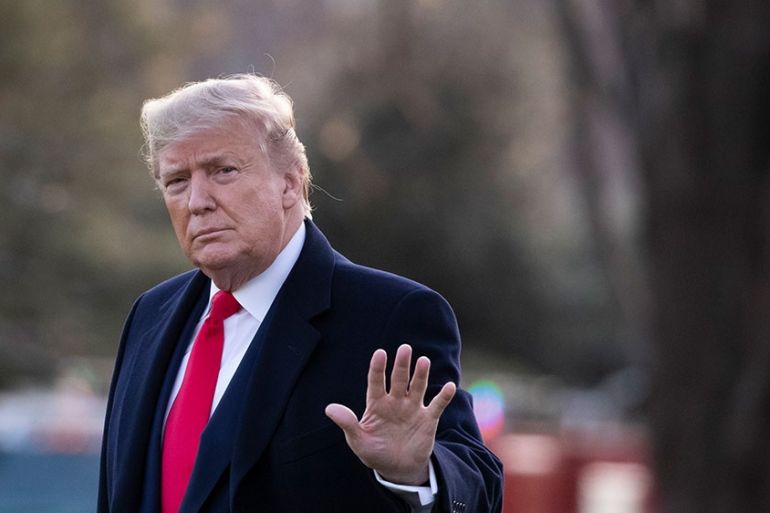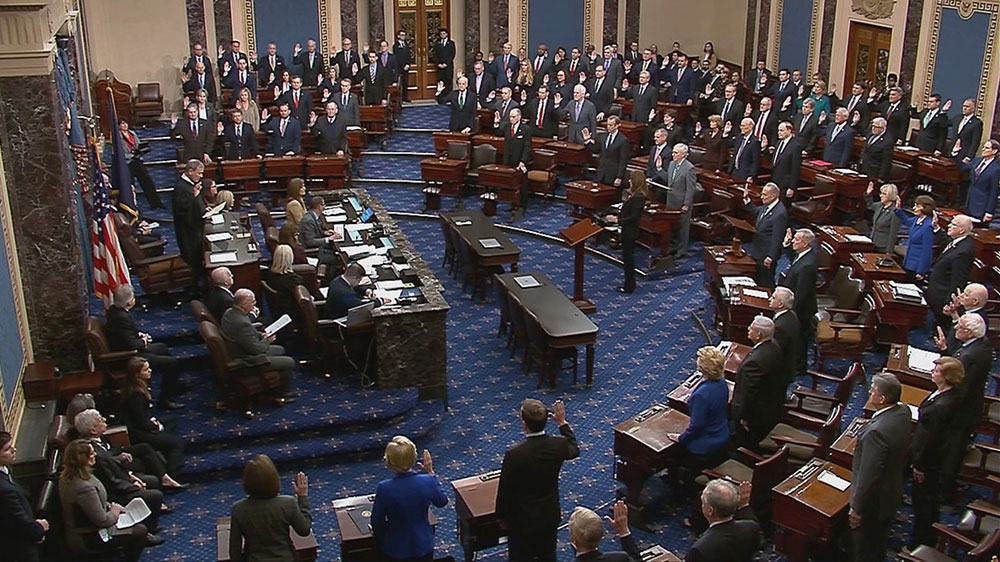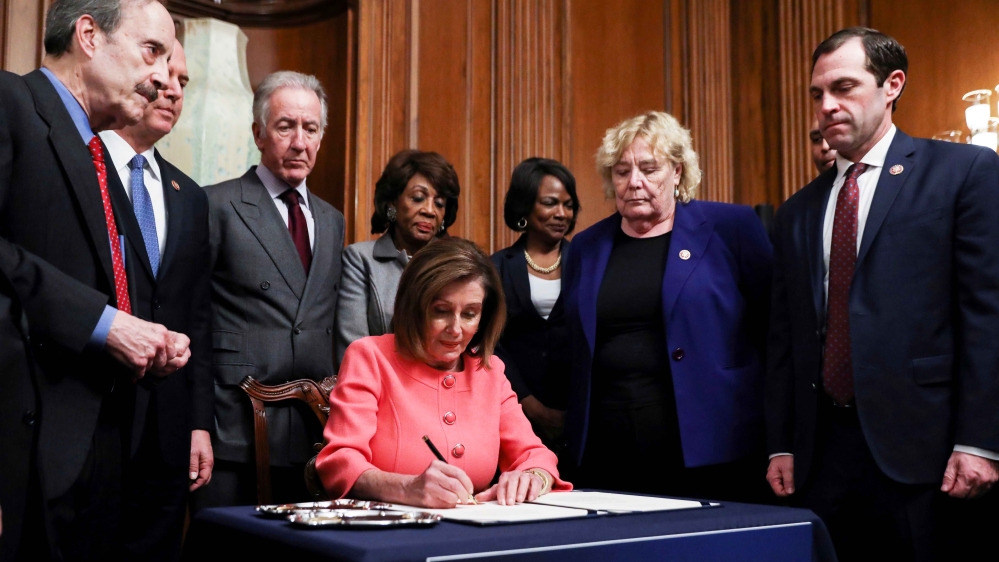Trump impeachment trial: Your questions, answered
What’s the atmosphere like? Why did Democrats impeach Trump knowing the likely outcome in the Senate? Five questions answered ahead of Trump’s impeachment trial.

Washington, DC – President Donald Trump has become only the third president in United States history to face an impeachment trial in the Senate.
The House of Representatives voted last week to forward two articles of impeachment against Trump for abuse of power related to his dealings with Ukraine and obstruction of Congress for his refusal to participate in the impeachment inquiry.
Keep reading
list of 3 itemsWatchdog: White House broke law by withholding Ukraine aid
Democrats release new documents ahead of Trump impeachment trial
All 100 senators will sit as a jury at trial while the House seeks to prosecute its case for conviction and removal of Trump for “high crimes and misdemeanors”. The president’s lawyers will offer a defence.
Here are answers to five questions many have asked about the process and what the trial means for Trump:
1. What is the atmosphere in Washington on Capitol Hill? Across the US?
The mood in the Senate chamber on Thursday when the impeachment trial opened with 99 of 100 senators present was extraordinarily somber, even deadly quiet – a stark contrast from when the chamber votes on legislative matters. One senator was absent due to a family emergency.
Senators are required to remain in their assigned seats without talking during the trial, under “pain of imprisonment”, according to an 18th-century rule.
Everyone stood when John Roberts, the chief justice of the Supreme Court, entered the chamber in black judicial robes and took an oath to administer impartial justice.
Democrat leader Chuck Schumer said he heard audible gulps from other senators on both sides as the chief justice ascended the Senate dias.
Senators were called individually to the front of the chamber one by one to sign an oath of impartiality.

One senator said he had the feeling of a pit in his stomach. Another said he could feel the weight of history on his shoulders.
Outside the Senate chamber, partisan division reigned as leading voices on both sides spun their cases for or against the president.
The country itself is sharply divided between Democratic and Republican voters over whether Trump should be removed from office, according to recent polling.
Most Americans are aware of the impeachment and say they are paying at least some attention, though it is not the obsession everywhere in the country that it is in Washington, DC.
2. Why did the Democrats vote to impeach, even though the outcome in the Senate is a near-certain acquittal?
There are several motivations behind the Democrats’ drive to impeach, which began almost as soon as Democrats won back control of the US House of Representatives in 2018.
The obvious big one is political. Control of the White House, Senate and House will be determined in the next election.
Even if the majority Republicans in the Senate circle a defence around their president and vote to acquit, Democrats are betting the impeachment itself will damage Trump and his Republican allies politically.
Another motivation is institutional. Trump has refused to cooperate with House Democrats not just in impeachment, but essentially in everything.
Congress guards its oversight responsibilities closely and Trump’s attitude has been provocative. Hence the obstruction of Congress charge.

If you also remember, House Speaker Nancy Pelosi waited to launch an impeachment inquiry for months, despite growing pressure within her caucus.
She said she could no longer wait following the whistle-blower complaint about Trump’s dealings with Ukraine and the Trump administration’s handling of it.
“The actions taken to date by the president have seriously violated the [US] Constitution,” Pelosi said in September, adding that “no one is above the law”.
For many members of Congress, Trump’s impeachment is an expression of both personal and political disapproval. Trump’s governing style has been crude and divisive, at times laced with overt racism, ill-informed arrogance and bungling. That has invited animus.
3. Will there be Republican defections? What about within the Democratic party?
At this point, it’s unlikely that many Republicans will vote to convict Trump on the articles of impeachment, although that could change if witnesses are called and more facts come out.
Republicans control the Senate by a 53-47 majority over Democrats and independents, which means it would only take four Republican defections to give Democrats control over how the trial proceeds.
So far, only three Republicans have signalled a willingness to side with Democrats on the question of calling witnesses, including Senators Mitt Romney of Utah, Lisa Murkowski of Alaska and Susan Collins of Maine.
Senate Democrats appear somewhat united on impeachment. One Democratic senator who is in a particular political quandary is Doug Jones of Alabama, a state where Trump is popular. Democratic Senator Joe Manchin of West Virginia, another state where Trump maintains high levels of support, has indicated he has not decided on whether he will vote to convict Trump.
Another Democrat to watch is Kyrsten Sinema, who has charted a fiercely non-partisan path in the Senate and represents a conservative state in Arizona.
4. What effect will a Senate trial have on Trump’s popularity, legacy and 2020 prospects?
That is still somewhat of an open question given that Trump could still be re-elected to another four-year term in November.
House Speaker Pelosi says impeachment by the House, even if Trump is not convicted by the Senate, is already a permanent stain on his presidency.

Trump’s approval rating has been consistently low throughout his presidency so far, hovering around 42 percent according to polls, worse than any president since Jimmy Carter, who only served one term.
The impeachment trial will give Democrats several weeks of nationally televised proceedings to make their case that Trump is contemptuous of the US Constitution and unfit for office.
Trump plans to counter the Democratic messaging by attending the World Economic Forum gathering in Davos, Switzerland this week and emphasising the strength of the US economy, his best argument to US voters for re-election.
5. What is the likelihood that witnesses will be called during the Senate trial?
It is probable that witnesses will be called during the trial although the White House has been working with Republican leaders to try to prevent it.
Democrats are framing the issue of calling witnesses as a choice between a “fair trial” and a “cover-up” and are putting political pressure on vulnerable Republicans.

Witnesses were called in the 1999 impeachment trial of President Bill Clinton and several Republicans have signalled a willingness to hear witnesses in Trump’s case.
Former National Security Advisor John Bolton, who declined to be interviewed by investigators during the House’s impeachment inquiry said he would be willing to testify to the Senate.
Bolton has first-hand knowledge of how Trump orchestrated the pressure campaign on Ukraine to announce investigations of the Bidens.
Other potential witnesses Democrats want to hear from include; Mick Mulvaney, acting chief of staff, Robert Blair, a senior adviser to Mulvaney, and Michael Duffey, a senior White House budget official. Trump blocked them from appearing before the House impeachment inquiry.
One more potential witness is Lev Parnas, a Ukrainian-born businessman who was working with Trump’s personal lawyer Rudy Giuliani to get the Ukrainians to announce investigations of Biden. Parnas turned over texts and emails to House investigators and said in media interviews he would welcome an opportunity to testify.
Some Republicans, on the other hand, have said they may want to hear from Biden’s son, Hunter, who served on the board of a Ukrainian gas company.